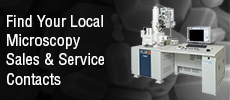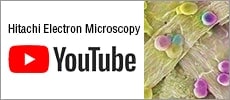Sample Cleaner ZONESEMII

The ZONESEMII Tabletop Sample Cleaner uses UV-based cleaning technology to minimize or eliminate hydrocarbon contamination for electron microscopy imaging.
Overview
Preparing, handling, or storing samples at atmospheric conditions may increase hydrocarbon build-up on the specimen, and under the influence of an electron beam these hydrocarbons can form a thick layer on the surface. Cleaning the sample surface with ZONESEMII removes hydrocarbons and reduces available molecules for beam induced contamination. Preventing contamination from specimen surfaces is essential for true observation in electron microscopy.
ZONESEMII utilizes vacuum-controlled UV irradiation and activated oxygen to gently remove hydrocarbons from the specimen surface prior to imaging and without the use of any chemicals or reagents. With a lab-friendly footprint and intuitive touch screen, the second-generation ZONESEMII is a safe, easy-to-use addition to any laboratory.
Features
ZONESEMII

Designed specifically for Hitachi specimen holders, the ZONESEMII provides optimized sample cleaning and storage modes of operation. The ZONESEMII serves as an excellent desiccator to prevent holder out-gassing.
- Easy-to-use touchscreen panel
- Programmable up to 24hrs
- Variable pressure control
Cause of contamination
Interactions between hydrocarbons on the specimen surface and the irradiated electron beam generate sample contamination. Hydrocarbons are generally non-covalently attached to the specimen surface during sample handling, preparation, and storage.

Cleaning Process
The ZONESEMII uses a UV lamp with wavelengths of 185 nm and 254 nm to efficiently remove hydrocarbons. Ozone is generated from oxygen in the vacuum-controlled specimen chamber, and generated ozone is broken into oxygen and activated oxygen. Hydrocarbons on the specimen surface are broken into volatile molecules such as CO2, H2O by radical oxygen and UV. The exhaust pump evacuates the free molecules from the sample chamber.

Application Data
Sample: Mesoporous Silica


Sample: ITO thin film on glass printed circuit board


Sample: Au Particles on Carbon
ZONESEMII enhances EDS analysis.
SEM Image


EDS Mapping Image


Specification
Specification
| Description | |
| Model No. | ZONE-2010 |
| UV Lamp | Wavelengths: 184 nm, 254 nm
(visible light, green and infrared light) |
| Specimen Size | 100 mm(D) × 37 mm(H) |
| Process Mode | UV Cleaning mode, Vacuum storage mode |
| Vacuum Setting | Settable by 100 phases of vacuum pressure |
| Process Setting Time | One minute to approximately 24 hours |
| Vacuum Pump | Dry vacuum exhaust system |
| Ozone exclusion | Built-in Ozone exclusion device |
| Unit Dimension | 310 mm(W) × 260 mm(D) × 305 mm(H) |
| Weight | 18 kg |
Setting Condition
| Description | |
| Room Temperature | 15 - 30 degrees C |
| Humidity | ≤ 70% (no condensing dew) |
| Power Supply | Power Supply: AC100 V - 240 V(±10%), 50/60 Hz 0.14 kVA |


